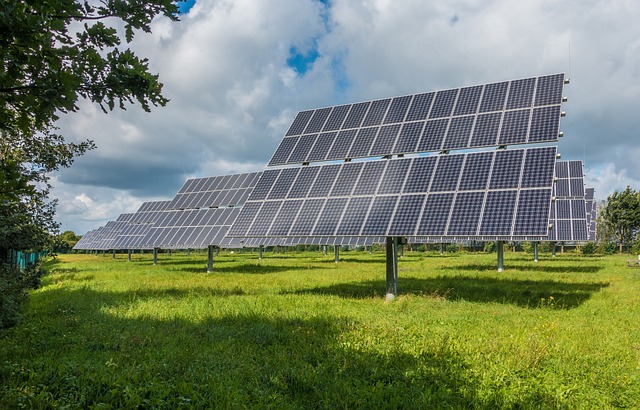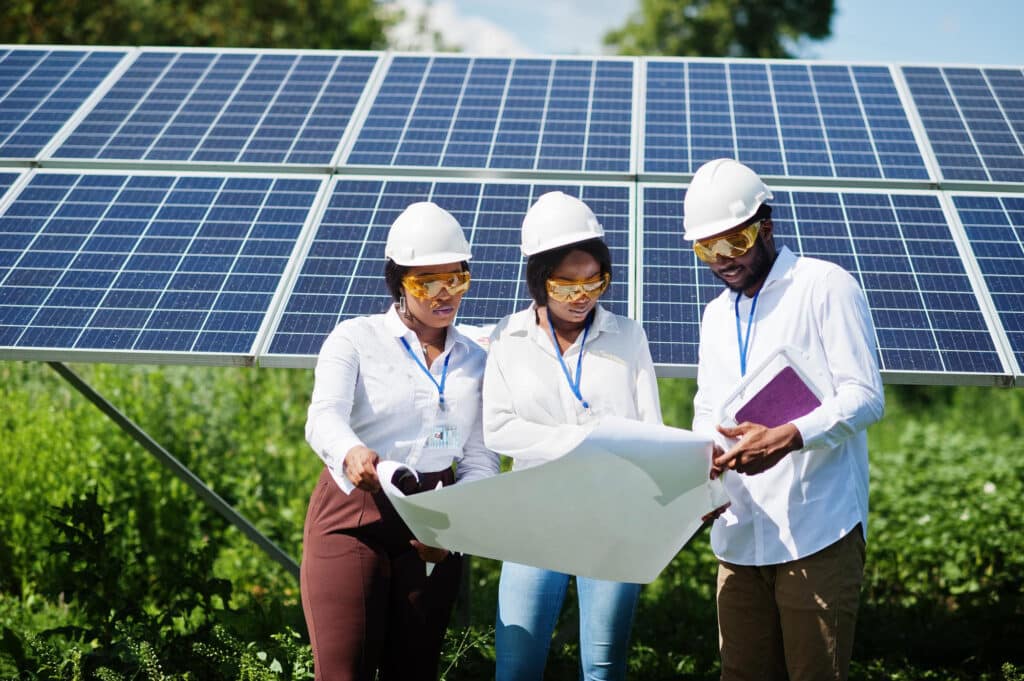Solar Power Grid Independence Ghana: Achieve Energy Freedom
Solar Power Grid Independence Ghana: Learn how Ghana is embracing solar energy to achieve grid independence, reduce fossil fuel dependency, ensure reliable power supply, lower energy costs, and support a greener future.
Ghana’s push for solar power grid independence is a significant step towards sustainable energy. The country experiences abundant sunlight, making solar energy a viable option. By investing in solar infrastructure, Ghana can reduce its dependency on imported fossil fuels. Solar power offers a cleaner, renewable alternative that can help mitigate climate change.
It also promises to create jobs and spur economic growth. The government’s commitment to renewable energy is evident through various initiatives and partnerships. Local communities will benefit from improved energy access and reduced electricity costs. Ghana’s journey towards solar power grid independence sets an example for other nations aiming for sustainable development.

Introduction To Solar Power In Ghana
Ghana is embracing solar power for a sustainable future. Solar energy is abundant in Ghana. The sun shines most of the year.
Current Energy Landscape
Ghana relies on hydropower and thermal power for electricity. Hydropower comes from dams. Thermal power uses gas and oil. But these sources have problems.
- Hydropower depends on rainfall. Less rain means less power.
- Thermal power relies on fossil fuels. These are costly and polluting.
The current energy landscape is not sustainable. Ghana faces power cuts. This affects homes and businesses.
Importance Of Solar Power
Solar power offers many benefits for Ghana. It is a clean energy source. It reduces pollution and carbon emissions.
Solar power is also renewable. The sun provides endless energy. This ensures energy security for Ghana.
Additionally, solar power can reach remote areas. It brings electricity to rural communities. This improves their quality of life.
| Benefits of Solar Power |
|---|
| Reduces pollution |
| Renewable energy source |
| Energy security |
| Reaches remote areas |
Solar power is vital for Ghana’s future. It supports the economy and the environment.
Benefits Of Solar Power
Solar power offers numerous benefits for Ghana. It supports grid independence and sustainability. This section explores the key advantages.
Environmental Impact
Solar power is a clean energy source. It reduces greenhouse gas emissions. This helps combat climate change. Solar panels produce no air pollution. They also reduce reliance on fossil fuels. Ghana’s environment can benefit greatly from this.
Economic Advantages
Solar power can save money on electricity bills. Households and businesses can cut costs. Solar energy is abundant and free. Once installed, solar panels require low maintenance. This makes them a cost-effective solution.
| Economic Advantage | Details |
|---|---|
| Cost Savings | Reduces electricity bills significantly. |
| Low Maintenance | Panels require minimal upkeep after installation. |
| Job Creation | Creates jobs in solar panel installation and maintenance. |
- Energy Independence: Reduces reliance on imported energy.
- Stable Energy Prices: Solar power is not subject to price fluctuations.
- Resilient Infrastructure: Solar power supports a more resilient energy grid.
Support For Rural Areas
The government also focuses on support for rural areas. Rural areas often lack access to the power grid. Solar energy can provide a reliable power source.
- Solar panels are installed in remote villages.
- These panels provide electricity for schools and hospitals.
- Solar power helps improve the quality of life.
The government provides training for local technicians. These technicians maintain and repair the solar systems. This ensures the sustainability of the solar projects.
Overall, these initiatives show the government’s commitment to solar power. They aim to achieve grid independence and enhance energy security.
Challenges And Solutions
Ghana’s solar power grid independence faces many challenges. Yet, solutions are also present. This section will explore these issues. We will focus on infrastructure and technological barriers. Each challenge comes with a solution.

Infrastructure Issues
The current infrastructure in Ghana is not fully ready for solar power. Many rural areas lack electric grids. These areas need solar systems most. But, they cannot support them yet.
Urban areas have better grids. But, they face other issues. Old equipment and power lines are common problems. These grids need upgrades to handle solar power.
Solutions:
- Invest in new power lines and grids.
- Focus on rural areas first.
- Upgrade urban grids with modern equipment.
- Use microgrids for isolated communities.
Technological Barriers
Technological barriers also slow down solar adoption. Lack of skilled workers is a big issue. Few people know how to install and maintain solar panels.
Another problem is battery storage. Solar energy needs to be stored for use at night. Batteries are costly and not widely available in Ghana.
Solutions:
- Train more workers in solar technology.
- Import affordable battery storage solutions.
- Partner with tech companies for better solar tech.
- Encourage local manufacturing of solar components.
Addressing these challenges will help Ghana achieve solar power grid independence. Each solution moves the country closer to a sustainable future.
Success Stories
Solar power has changed lives in Ghana. Many communities and individuals now enjoy energy independence. This section shares their inspiring stories.
Community Projects
Many Ghanaian communities have started solar power projects. These projects provide reliable electricity. They also support local economies and improve daily life.
- Installed solar panels on all homes
- Electricity for schools and clinics
- Improved local businesses with stable power
- Solar panels power classrooms and labs
- Students now have access to computers
- Increased study hours due to reliable lighting
Individual Case Studies
Individual households have also benefited from solar power. These case studies highlight their success stories.
- Installed a 5kW solar system
- Reduced electricity bills by 70%
- Enjoys power even during outages
- Solar power runs all bakery equipment
- Reduced operating costs significantly
- Increased production and profits
| Project | Benefits |
|---|---|
| Akosombo Village | Stable power, improved businesses |
| Sunshine School | Better education, more study hours |
| Kwame’s Family | Lower bills, power during outages |
| Adjoa’s Bakery | Lower costs, higher profits |
Steps To Achieve Grid Independence
Achieving grid independence in Ghana through solar power requires a structured approach. This involves careful planning, smart investments, and efficient implementation strategies. Here are the steps to make Ghana’s solar power grid independence a reality.
Planning And Investment
The first step is planning and investment. This includes determining the energy needs of the region. It’s important to assess the current energy consumption. Future growth projections should also be considered.
Next, investment is crucial. Funding must be secured for the project. This could come from government sources, private investors, or international grants. A detailed budget plan should outline all costs involved.
| Planning Steps | Details |
|---|---|
| Energy Needs Assessment | Analyze current and future energy requirements. |
| Funding Sources | Identify potential investors and grants. |
| Budget Planning | Outline all costs, including installation and maintenance. |
Implementation Strategies
Once planning and investment are sorted, focus shifts to implementation strategies. Effective implementation involves selecting the right technology. Solar panels and storage systems must be chosen carefully.
Another key step is installation. Qualified technicians should handle the setup. The installation process must follow safety standards. Regular maintenance should be scheduled to ensure efficiency.
- Choose the right solar panels and storage systems.
- Ensure installation by qualified technicians.
- Follow safety standards during installation.
- Schedule regular maintenance checks.
Technological Innovations
Technological innovations are transforming solar power grid independence in Ghana. These advancements are making solar energy more efficient and accessible. Let’s explore some key technologies driving this change.
New Solar Technologies
New solar technologies are revolutionizing energy production in Ghana. Modern solar panels are more efficient and durable. They capture more sunlight and convert it into electricity.
- Monocrystalline Panels: These panels offer higher efficiency and lifespan.
- Polycrystalline Panels: More affordable and easier to produce.
- Thin-Film Panels: Lightweight and flexible, ideal for varied installations.
Solar tracking systems are another game-changer. They follow the sun’s path, maximizing energy capture. This technology boosts the efficiency of solar panels by up to 25%.
Energy Storage Solutions
Energy storage is crucial for solar power grid independence. It ensures a reliable energy supply even when the sun isn’t shining. Let’s look at some key storage solutions.
| Storage Type | Advantages |
|---|---|
| Battery Storage | Stores excess energy for later use. |
| Pumped Hydro | Uses water reservoirs to store energy. |
| Flywheel Storage | Uses rotational energy for storage. |
Battery storage is the most common solution. Lithium-ion batteries are popular for their high energy density and long life. They store excess energy generated during sunny periods. This energy can be used during cloudy days or at night.
Pumped hydro storage is another effective method. It uses water reservoirs to store and release energy. This method is efficient but requires specific geographical conditions.
Flywheel storage uses rotational energy to store electricity. It offers quick energy release and is highly durable.
These energy storage solutions ensure a stable and reliable energy supply. They make solar power grid independence in Ghana a reality.
Future Prospects
Ghana is on the brink of a solar power revolution. The country’s vision for energy independence is inspiring. Let’s explore the future prospects of solar power grid independence in Ghana.
Long-term Vision
Ghana aims to be a leader in renewable energy. The government plans to increase solar energy capacity. They want to reduce reliance on fossil fuels. This move will also decrease greenhouse gas emissions. The goal is a sustainable and green future for all citizens.
The government has set ambitious targets. By 2030, they aim for 10% of energy from renewable sources. Solar power will play a big role in achieving this target. They plan to install large solar farms across the country.
Potential For Growth
The potential for solar power in Ghana is immense. The country has abundant sunlight throughout the year. This makes it ideal for solar energy production.
Investment in solar technology is rising. Local and foreign companies are showing interest. They are investing in solar projects. This will create jobs and boost the economy. The local communities will benefit greatly.
The cost of solar panels is decreasing. This makes solar energy more affordable. More households can switch to solar power. They can enjoy reliable and clean energy.
Here are the key benefits of solar power in Ghana:
- Reduction in energy costs
- Decreased environmental impact
- Job creation in the renewable sector
- Enhanced energy security
The future is bright for solar power in Ghana. The country is committed to a sustainable energy future. With continued investment and support, Ghana will achieve grid independence.
Frequently Asked Questions
What Is Solar Power Grid Independence Ghana?
Solar power grid independence means generating your own electricity from solar panels. This reduces reliance on the national grid. It’s sustainable and cost-effective.
How Does Solar Power Benefit Ghana?
Solar power in Ghana provides clean, renewable energy. It reduces electricity costs and reliance on fossil fuels. It also supports rural electrification.
Is Solar Power Cost-effective In Ghana?
Yes, solar power is cost-effective in Ghana. Initial setup costs are high, but long-term savings on electricity bills are significant.
Can Solar Power Work During Cloudy Days?
Yes, solar power works on cloudy days. Solar panels can still generate electricity from indirect sunlight, though at reduced efficiency.
Conclusion
Embracing solar power in Ghana offers a path to energy independence. It promotes sustainability and economic growth. With abundant sunlight, the potential is immense. Investing in solar technology can transform Ghana’s energy landscape. The future looks bright with solar energy leading the way.
Explore solar solutions today for a greener tomorrow.
